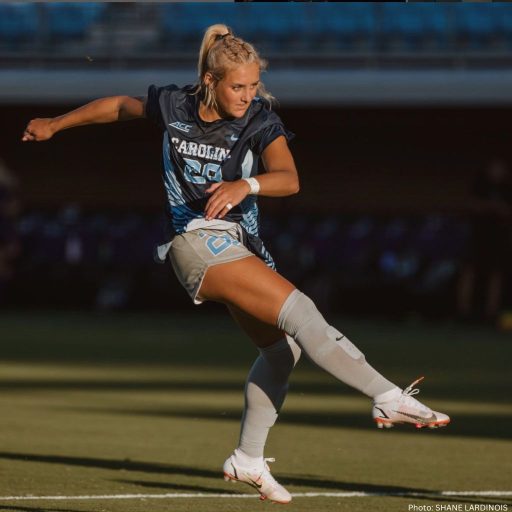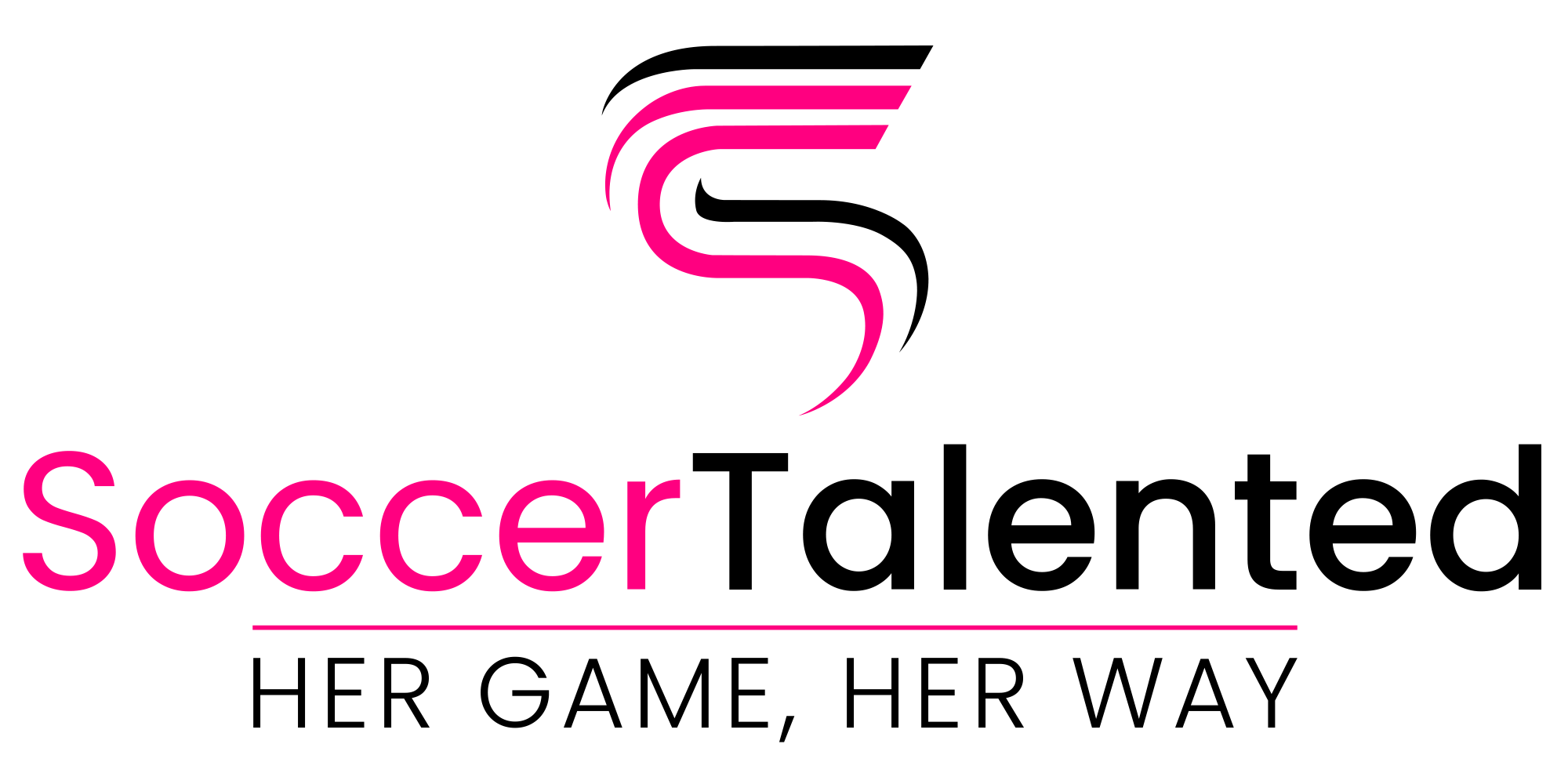Supporting Your Daughter's College
and Professional Soccer Path
By Scott Pierce, Father of
Pro Player Maggie Pierce
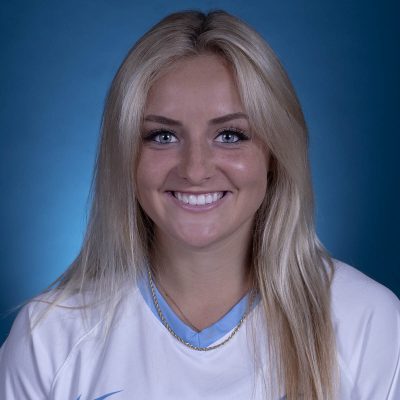
Kickoff
In the journey of nurturing a child’s passion for sports, soccer parents often find themselves in uncharted waters.
Such was the experience of Scott Pierce as he witnessed his daughter Maggie’s blossoming soccer career.
In this Q&A interview with Soccer Talented, Scott delves into the intricacies of their family’s adventure.
From discovering the world of youth soccer, the importance of diverse training, and the challenges of college recruiting to navigating the realms of professional play.
Offering insights and advice for other parents, Scott’s story is not just about Maggie’s pursuit of soccer stardom.
It’s more about the shared experiences, challenges, and rewards that come with being the biggest supporter of your child’s dreams.
Table of Contents
How did you support Maggie's soccer development from a young age?
We didn’t know much about soccer when Maggie started to play seriously. The best support we could give was to do some research and aim to get her exposure to outstanding youth coaches.
One of these was Michael Brady, the current Associate Head Men’s Coach at Duke. He coached his daughter and Maggie in youth soccer and stoked Maggie’s enthusiasm for the game.
Another influential coach was Scottie Schweitzer, who runs a highly-regarded youth training program close to us called Next Level Academy. He also brought out the best in Maggie.
We were fortunate to live in Cary, NC, an area with many soccer resources. We tried to support Maggie by offering her various playing opportunities, including indoor, small-sided 3v3 and 7v7, futsal, and coordinated pickup.
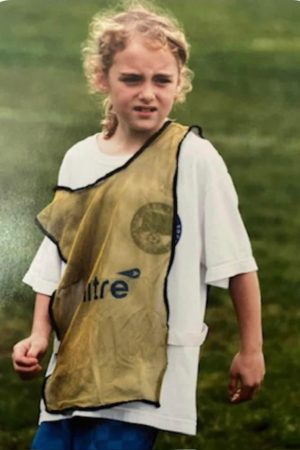
Did Maggie pursue other interests alongside soccer, and how did these activities benefit Maggie’s growth and skills?
In addition to soccer, Maggie participated in swimming, cross-country, lacrosse, track and field, and youth triathlons. She also engaged in various outdoor activities, including horse riding and hiking.
We kept her out of travel soccer longer than most others playing at a high level. This allowed her to enjoy these diverse activities and avoid the burnout that can impact overwhelmed youth players.
However, if the player wants to develop and eventually play at a high level, they will probably have to start giving up at least some outside activities.
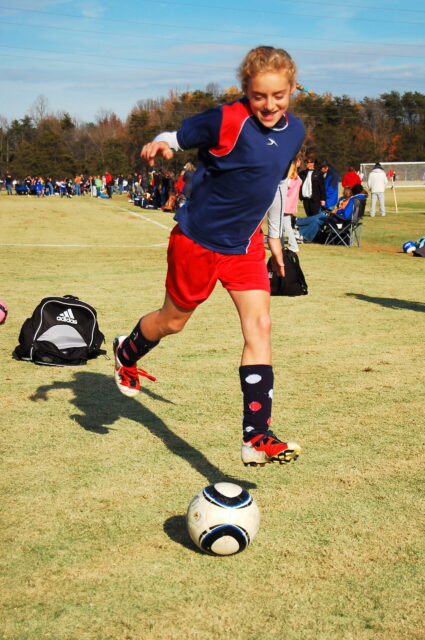
How did Maggie manage travel and downtime with her schedule? Did it affect her social or study time?
This will be a challenge for players from when they start to play on a travel team through college. Hopefully, developing time management skills early will prove beneficial later in life.
As soccer parents, we tried to help. For example, planning efficient carpools to reduce dead time and creating study periods before training sessions. We also advocated for fewer long travel weekends when closer competitive teams were available.
What factors aided Maggie's soccer success in high school?
Maggie was fortunate to play 2 years of high school soccer as a freshman and sophomore. This was before clubs restricted participation by players on the top teams.
She played for a good coach and was on a strong team. The training and gameplay were beneficial, and the social interactions with older players eased her transition into the first year of high school.
In addition, playing in the NC State High School Championship gave Maggie the unique opportunity to play in front of a large and vocal crowd. This experience helped her prepare for later participation in the ACC and NCAA championships.
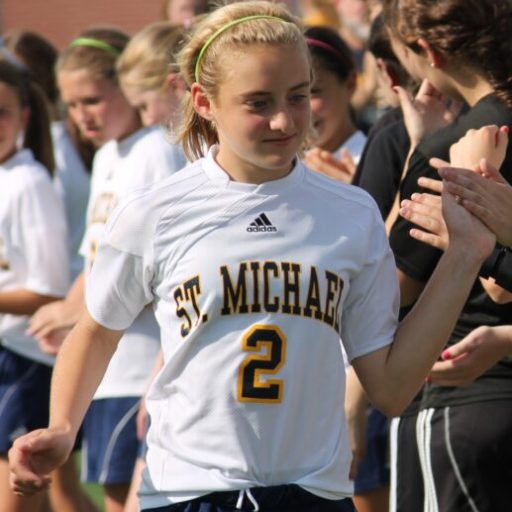
What training and coaching opportunities did Maggie access during high school?
This one is a little tricky to offer as advice to soccer parents. If your player is with a big club, they might not appreciate her doing extra training and seeking other opportunities, so be aware of that warning. But here are the most valuable training opportunities I can recall:
Pickup Soccer with Men/Boys
This provides invaluable exposure to a faster and more physical level of play. It also encourages creativity compared to the structure of club play.
Summer play in the WPSL
This is more common now, but very few club players did this when Maggie was 14-15. She played for a team named Oak City, gaining exposure to a variety of players.
For instance, she learned from Dena Floyd, who had played at the University of Florida and, I believe, had been on a National Championship team there. Dena and others like her offered significant mentoring to Maggie.
Indoor Leagues, 3v3, 7v7, Futsal, ODP, and College ID Camps
While top clubs offer a structured platform, becoming too insulated is possible. Finding ways to compete against players in different formats and listening to different coaching perspectives can strengthen a player in the long run.
How was Maggie's college recruiting process, and what advice would you offer parents going through it with their daughters?
Maggie met with Anson Dorrance, Head Coach at UNC, and committed to UNC just after her 15th birthday, so I don’t have as much good advice for parents on this one as the rules have changed so much since then.
One piece of advice that may be of value is to get input into your player’s skill set. Seek opinions on where they might fit in on a college team from neutral sources who know a lot about the game.
Current and potential future coaches and trainers should give input, too, but they have vested interests. If you can find resources to provide you with honest input, like an impartial college coach who has seen your daughter play a lot, it’s beneficial. This is especially true if the coach knows she is not coming to their school.
Parents of players already in college who are familiar with the process and have watched your daughter play often are also valuable voices to consider.
Most parents are not good at honestly evaluating their daughter as a player, so quality outside input helps.
How did mentors and role models influence Maggie's sports development?
Helping your daughter find mentors and role models is a big part of her success. Maggie was fortunate to follow Christina Gibbons and Morgan Reid through the same middle and high schools. Both had outstanding high school and collegiate careers and played professionally.
She also had a good role model in her older sister, Annie. She ran on and served as a leader for a high school cross-country team that won a remarkable 4 consecutive state championships. She continued as a leader for the NC State cross-country team that has won an equally impressive 2 NCAA championships in a row.
Maggie was able to observe these teams, so she understood at an early age the dedication needed to compete at an elite level.
Maggie also gained insights by observing two other coaches. She witnessed how Nick Mangum built a superb athletic program as the cross-country coach at Cardinal Gibbons High School.
Additionally, she observed Laurie Henes, who coaches the women’s cross-country team at NC State and is targeting a 3rd straight NCAA championship this fall.
Did Maggie face doubts or obstacles, and how did she overcome them?
Soccer parents, get ready for the ups and downs! If your player glides through 4 years at a top soccer school without doubts or obstacles, she will be a rarity. Obstacles range from balancing soccer with academics to managing relationships to recovering from losses, but I think that injuries are the most common obstacle.
After the high of coming out and starting as a freshman at home versus Duke University in a nice win, near the end of the match Maggie sprained her ankle badly and missed significant training and game time. Then, just as she was peaking again, she tore her ACL and missed the next season while rehabbing.
Maggie was able to overcome the injury obstacles due to great support from the UNC coaching and training staff, her fellow players, and also from other players outside UNC who had suffered a similar injury.
What skills or qualities did Maggie develop in college that benefited her professionally?
UNC focuses on competitive training sessions and on fitness. Showing up for her first pro session fit and prepared for a game-like competitive workout likely helped her reputation and earned her a starting spot from her first pro game.
Being able to play multiple positions also helps when you show up to a new team.
Having played attacking mid, holding mid, and center back in youth and college, Maggie was versatile on the field. She played all those positions, plus some outside back and striker, early for Shelbourne FC in Ireland before settling in at center back.
In addition, playing multiple positions has led to more interest in Maggie from other teams in Europe and Australia. These teams usually seek specific positions to fill during the transfer window.
How did you find reputable agents for Maggie in Europe?
Maggie navigated this process, but from what I know most of the valuable information came to her from word-of-mouth of others playing in Europe. This is where Soccer Talented adds a lot of value by listing agent information and questions to ask agents. They also provide the opportunity to talk with their mentors who have this experience.
Were you able to contact other U.S. players who succeeded in European leagues?
Maggie reached out to some players competing in Europe and Australia, and those contacts were the best source of relevant information for her regarding the teams and leagues for US players to join.
I hope Soccer Talented fills some information gaps by consolidating information for US women who want to play overseas. To my knowledge the information gathering process is still pretty fractured and word-of-mouth.
I believe that Maggie joined Shelbourne FC because Heather O’Reilly, an Assistant Coach at UNC, had played for them last season when they were competing in the UEFA Women’s Champions League. Heather connected Maggie with the coaching staff and Maggie has fit in there nicely.
Shelbourne FC competed in the UEFA Champions League again in September 2023 in Lithuania, another unique experience in Maggie’s soccer journey.
What advice do you have for parents whose daughters aspire to play soccer at a college or professional level?
If your daughters have these aspirations and the skill set, I recommend parents provide them with as many training opportunities as possible and as you think is healthy.
However, you should refrain from taking the lead and pushing them into something where they may not be equipped. That is a fine line to draw.
As mentioned in a previous question, parents can help their daughters hear multiple quality coaching voices and listen to sources of unbiased information regarding their skill set.
In addition, soccer parents can help their daughters understand potential playing opportunities and find the appropriate level of competition in and beyond college.
As a parent, what's been the most rewarding part of seeing Maggie chase her soccer dreams?
I am not sure whether the old saying about athletics revealing character vs. building it is true or not. Watching your daughter go through the emotional and physical highs and lows of high-level competitive soccer has been enlightening as a parent. How they react to both the laughter and tears and grow from both has been pretty rewarding.
Final Whistle
As soccer parents, supporting a child’s ambitions is a journey replete with its own set of challenges and triumphs. Through the story of Maggie and her soccer aspirations, Scott Pierce has painted a vivid picture of the commitment, sacrifice, and joy associated with nurturing a budding athlete.
The lessons from their experiences serve as invaluable advice for parents embarking on similar adventures with their daughters.
Whether your child is eyeing the soccer fields, the basketball courts, or the stages of a theatre, the underlying message remains universal: Be there, offer guidance, and celebrate every milestone, big or small.
After all, witnessing your child chase their dreams and grow along the way is one of the most rewarding experiences a parent can have.

Scott Pierce, Maggie's Dad
Scott Pierce is the proud father of Annie, Maggie and Abby and husband to Jennifer.
He is a graduate of West Point, Ranger School, Airborne School, and the Special Forces Qualification Course. He has a Masters in Security Studies from the Army War College and an MBA from the Wharton School.
Scott served on the East-West German border with the 2nd Armored Cavalry Regiment and was there when the Cold War ended in 1989.
He later worked as a bond trader in New York City for JP Morgan and Bank of America. He rejoined the military after the attacks of Sept. 11th.
He returned to the bond business to help start Pierpont Securities. After several mergers the firm was recently acquired and is now Santander US Capital Markets.
Scott and Jennifer enjoy travelling to see their daughters. Their most recent trip was to Lithuania to see Maggie play in the UEFA Champions League and celebrate their 25th anniversary. Scott enjoys hiking and shooting and will fit in the occasional game of pickleball.

Maggie Pierce
From Raleigh, NC, Maggie Pierce is a professional women's soccer player for Dublin's Shelbourne FC. Since her 2022-2023 mid-season start, she's twice been on the League of Ireland Team of the Week and competed in the UEFA Women's Champions League.
A 2022 UNC-Chapel Hill graduate with a BA in Communications and Art History minor, she played in ACC and NCAA tournaments each season, other than when COVID-19 suspended them.
As an Ambassador and Mentor for Soccer Talent, Maggie helps young female players with her insights. Follow her for informative soccer tips with her articles and videos.
